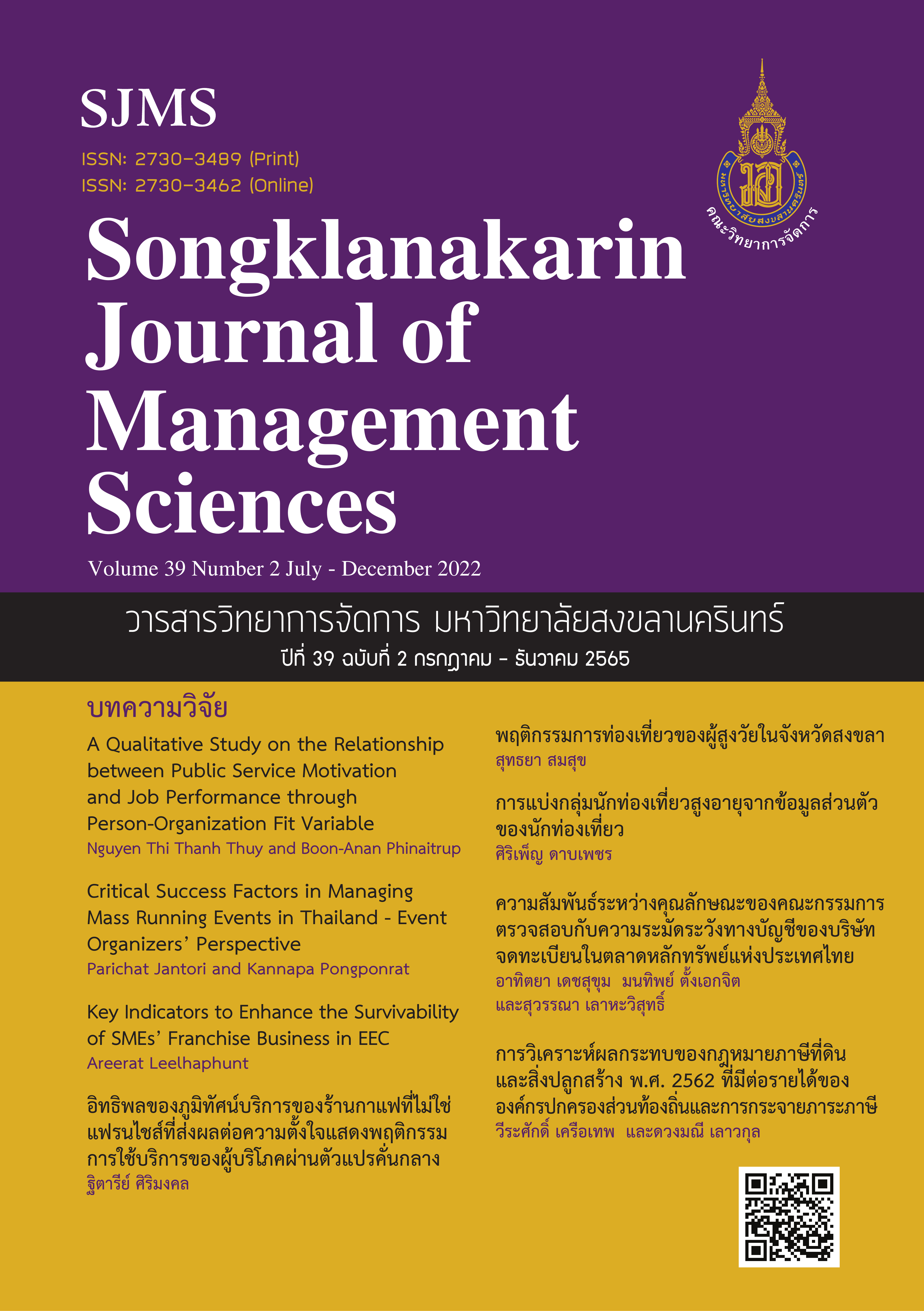Key Indicators to Enhance the Survivability of SMEs’ Franchise Business in EEC
Main Article Content
Abstract
Based on some challenges of the classic belief in the strategic alliance approach, many business sectors utilize it to either creating a competitive advantage or minimizing the risk of business failure, especially in the franchise business. As such, this study’s objective seeks to explore the 3 key indicators in enhancing Franchise Business Survivability (FBS) in the Eastern Economic Corridor (EEC): (1) direct effect of Trust; (2) mediating effect of Relationship Satisfaction (RS), and (3) moderating effect of Commitment. The 400-target SMEs are determined by proportional stratified sampling and collecting data is done by judgment and convenience methods with an on-site questionnaire collection. For data analysis, construct validity is performed by first-order confirmatory factor analysis, and hypothesis testing is performed by multiple regression analysis and Sobel test. The result reveals that Trust and RS are the key indicators in enhancing FBS. On other hand, it is also found that a strong commitment is unable to reinforce RS of both franchisor-franchisee in which contributes to overall franchise business performance. Hence, both franchisor-franchisee should focus on developing a higher level of Trust and RS by providing honest and consistent business operations, while they should avoid misunderstanding and unfair franchise agreements that interrelate to their commitments. Therefore, the result of this study would create an awareness of the key indicators in enhancing the survivability of franchise business and to understand the strategic alliance approach affecting the survivability of Small and Medium Enterprises (SMEs) franchise business in the EEC of Thailand.
Article Details

This work is licensed under a Creative Commons Attribution-NonCommercial-NoDerivatives 4.0 International License.
All published articles are SJMS’s copyright. The editorial board allows all published articles to be copied, excerpted, or disseminated with academic citation.
References
Altinay, L., & Brookes, M. (2012). Factors influencing relationship development in franchise partnerships. Journal of Services Marketing, 26(4), 278-292.
Dant, R. P., Weaven, S. K., & Baker, B. L. (2013). Influence of personality traits on perceived relationship quality within a franchisee-franchisor context. European Journal of Marketing, 47(1/2), 279-302.
Department of Business Development. (2019). Annual Report 2019. Retrieved April 15, 2020, from https://dbd.go.th/download/foreign_file/pdf/AnnualReport_FBA_2019.pdf
Dube, B., Mara, C., & Ntimane, V. (2020). Perceptions of franchise stakeholders on trust in franchising relationships. African Journal of Hospitality, Tourism and Leisure, 9(1), 1-12.
Elmuti, D., & Kathawala, Y. (2001). An overview of strategic alliances. Management Decision, 39(3), 205-218.
Fernandez-Monroy, M., Martin-Santana, J., & Galvan-Sanchez. (2018). Building successful franchise partnerships: the importance of communication and trust. Management Decision, 56(5), 1051-1064.
Fornell, C., & Larcker, D. F. (1981). Structural equation models with unobservable variables and measurement error: Algebra and statistics. Journal of Marketing Research, 18(3), 382-388.
Frazer, L., Weaven, S., Giddings, J., & Grace, D. (2012). What went wrong? Franchisors and franchisees disclose the causes of conflict in franchising. Qualitative Market Research: An International Journal, 15(1), 87-103.
Grace, D., Weaven, S., Frazer, L., & Giddings, J. (2013). Examining the role of franchisee normative expectations in relationship evaluation. Journal of Retailing, 89(2), 219-230.
Grant, R. R. (1991). The resource-based theory of competitive advantage: implications for strategy formulation. California Management Review, 33(3), 114-135.
Guilloux, V., Dubost, N., Kalika, M., & Gauzente, C. (2008). How franchiser and franchisee relationships affect franchisees’ satisfaction? The importance of fairness, communication, and trust as ethical bases of relationship marketing. International Journal of Entrepreneurship and Small Business, 6(1), 155-172.
Hair, J. F. (2010). Multivariate data analysis: A global perspective. Upper Saddle River: Pearson.
Hnuchek, K., & Trakulmaykee, N. (2015). The importance of perceived franchisor support toward franchisee satisfaction. Journal of Management Sciences, 2(2), 47-64.
Jang, S., & Park, K. (2019). A sustainable franchisor-franchisee relationship model: Toward the franchise win-win theory. International Journal of Hospitality Management, 76, 13-24.
Kline, R. B. (2016). Principles and Practice of Structural Equation Modeling. New York: The Guilford Press.
Krejcie, R. B., & Morgan, D. (1970). Determining sample size for research activities. Educational and Psychological Measurement, 30, 607-610.
Lorange, P., & Roos, J. (1992). Strategic alliances: Formation, implementation, and evolution. USA: Blackwell Publishers.
Lowensberg, D. A. (2010). A “new” view on “traditional” strategic alliances' formation paradigms. Management Decision, 48(7), 1090-1102.
Montgomery, C. (1995). Resource-based and Evolutionary Theories of the Firm: Towards a synthesis. Boston: Kluwer Academic Publishers.
Morgan, R. M., & Hunt, S. D. (1994). The commitment-trust theory of relationship marketing. The Journal of Marketing, 58(3), 20-38.
Preacher, K. J., Rucker, D. D., & Hayes, A. F. (2007). Addressing moderated mediation hypotheses: theory, methods, and prescriptions. Multivariate Behavior Research, 42(1), 185-227.
Prihandono, D. (2015). Enhancing Survivability in Indonesian Franchise Businesses in the Restaurant and Retail Sectors. Doctoral dissertation, University of Gloucestershire, UK.
Rodríguez, C. M., & Wilson, D. T. (2002). Relationship bonding and trust as a foundation for commitment in US-Mexican strategic alliances: A structural equation modeling approach. Journal of International Marketing, 10(4), 53-76.
Schumacker, R. E., & Lomax, R. G. (2004). A Beginner’s Guide to Structural Equation Modeling. New Jersey: Lawrence Erlbaum Associates, Inc.
Stanworth, J., Purdy, D., English, W., & Willems, J. (2001). Unraveling the evidence on franchise system survivability. Enterprise and Innovation Management Studies, 2(1), 49-64.
Thai Franchise Center, (2020). Franchise Directory. Retrieved April 17, 2020, from https://thaifranchisecenter.com/home.php
The Eastern Economic Corridor Office of Thailand, (2021). Government Initiative. Retrieved March 20, 2021, from https://www.eeco.or.th/en/government-initiative
Thorne, E. A., & Wright, G. (2005). Developing strategic alliances in management learning. Journal of European Industrial Training, 29(5), 383-404.
Wright, O., & Grace, A. (2011). Trust and commitment within franchise systems: An Australian and New Zealand perspective. Asia Pacific Journal of Marketing and Logistics, 23(4), 486-500.

